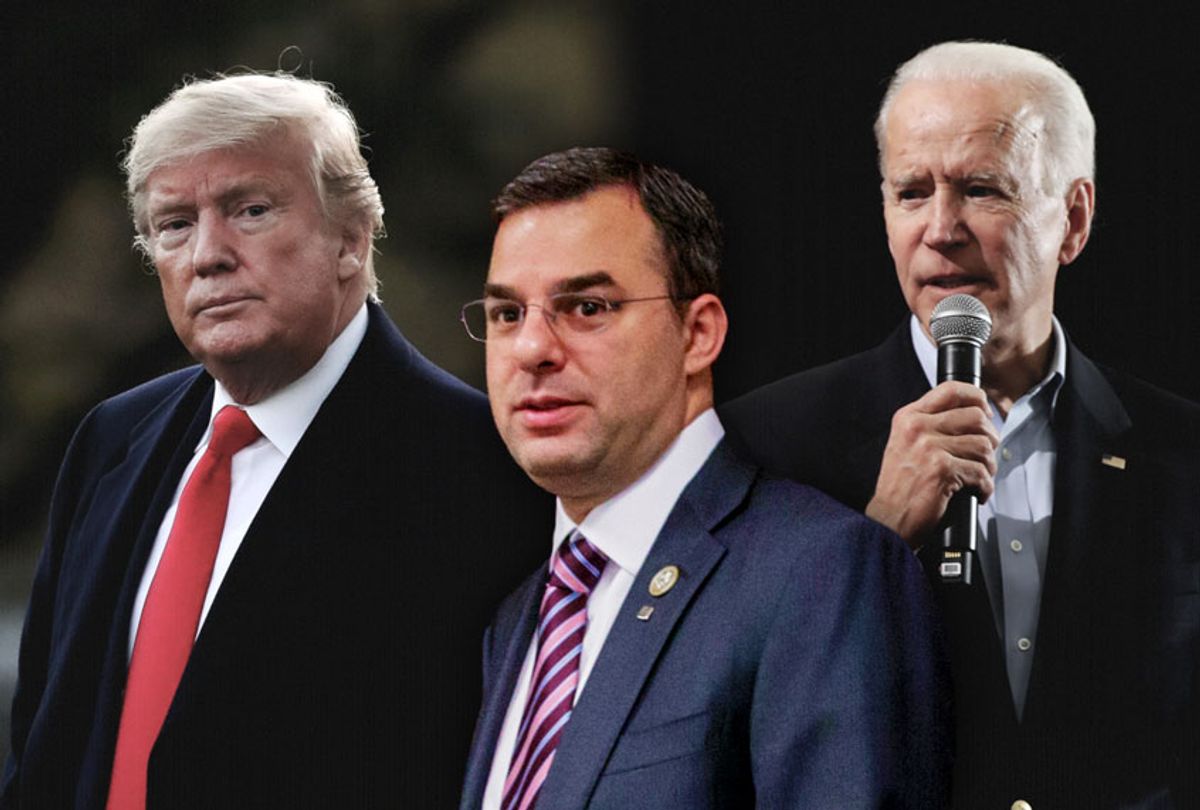Politics Twitter had a Groundhog Day moment last Tuesday night. We'd lived through this debate so many times before.
Would Justin Amash's Libertarian bid for the White House hurt Joe Biden or Donald Trump? Would the former Republican congressman drain votes from the president, or would he divide the anti-Trump vote? Was Amash another Jill Stein or Gary Johnson, Ralph Nader or Pat Buchanan, Ross Perot or John Anderson? To think that we have six more months of this!
Perspective is everything, and we'd improve our politics if we also stepped back for a fresh look at our elections. This tedious finger pointing and conjecture could be settled if we adopted ranked choice voting (RCV), reinforced the foundational notion of majority rule, and simply let voters decide.
The question shouldn't be who's harmed or who's helped by an independent or third party campaign. We shouldn't have to wonder about the motivations of the candidate. And we certainly shouldn't shame voters in a democracy who want more options. Instead, we ought to be thinking about how we guarantee that voters have rich choices and the ability to express them in full.
This isn't a reformer's blue-sky vision. It's real. This fall, Maine will lead the way, as the first state to use RCV in its presidential election — with a real chance that RCV will help determine electoral votes there. Democrats in five states used RCV this year in presidential primaries and caucuses. Voters in all 50 states deserve the benefit of this option that doesn't help one party or the other, but puts all voters first.
Instead, we're stuck in the same exhausting loop. In the New York Times, Republican strategist Liz Mair wrote that "to the extent that anyone needs to be worrying about Mr. Amash costing someone an election, it's probably more the Trump team than Democrats."
But Amash's candidacy was also greeted with groans from many Democrats and renegade voices within the conservative movement who worried that he would drain anti-Trump votes from Biden and make it easier for the president to carry key Electoral College battlegrounds like Michigan without winning a majority.
"My views align more closely with Amash's than Biden's," tweeted George Conway, the husband of Kellyanne Conway and a vocal anti-Trump conservative. "But the only real effect Amash could have in this campaign is to enhance Trump's chances. This is a terrible idea."
Washington Post columnist Jennifer Rubin, another former Republican driven away by Trump, wrote that she was "not anxious to make it any harder for Biden to win, and in no mood to tolerate spoilers."
One revealing quote came from the always interesting Jeff Hauser of the progressive Center for Economic and Policy Research, who noted on Twitter that Libertarian candidates often attract young men who "know Trump is bad" but are unlikely to be drawn to Biden. "To get them to vote Biden requires no other choice," he wrote.
With RCV, no one would be complaining about spoilers. We can't force independents out of the race. We can't force every choice down to two. And we can't keep having the same debate. RCV is the solution to all of these complaints, and it comes with the extra benefit of expanding choices rather than forcing everything into a binary contest of red vs. blue.
It's easy: Instead of picking one candidate, voters put their choices in order. RCV functions like an instant runoff. If someone wins 50 percent of a state's votes in the first round, they'd win the Electoral College votes. If not, the bottom candidates are eliminated one by one, and backup choices come into play. As a result, a Never Trump conservative like Conway could, if he desired, vote for Amash first and Biden second without risking that voting for an independent would help the major party candidate he likes least. And a Libertarian who'd ultimately rather see a Republican president appoint federal judges could put Amash first and Trump second.
Third-party candidates, in various ways, helped alter the presidential elections in 1992, 2000 and 2016. But by now, we ought to realize that they are here to stay. These voters will not be bullied into backing one of the two major-party candidates. Nor should they be. These candidates have every right to run. Voters have every right to support them.
But we also don't need to let third parties determine outcomes. In 2016, 13 states awarded their electoral votes to a plurality winner, including the decisive battlegrounds of Michigan, Pennsylvania and Wisconsin. (While Jill Stein of the Green Party bears most of the enmity from Democrats online, Libertarian nominee Gary Johnson actually won three times as many votes.) In 1992, when Ross Perot earned nearly 19 percent of the popular vote nationwide, an astounding 49 states were "won" with less than half the votes.
RCV would protect fair outcomes. Instead of scolding the small yet sometimes decisive percentage that votes third-party, both Republicans and Democrats ought to fix the real problem: An anti-majoritarian system that allows a candidate to win all of a state's Electoral College votes, sometimes with far less than a majority of the votes cast. It's confounding that the major parties continue to give this outsize power to minor parties rather than simply change the law and improve our elections. Voters would be empowered. Majorities would rule.
The conventional wisdom around Amash's bid will change many times over the race. We don't know in which states he'll get on the ballot. There's little polling to see how a Libertarian candidate might affect the race, especially state by state. Here's what we do know: We can be liberated from this quadrennial debate, just as Bill Murray finally escaped Groundhog Day. Maine has shown us the first step. It's time for other states to follow.



Shares